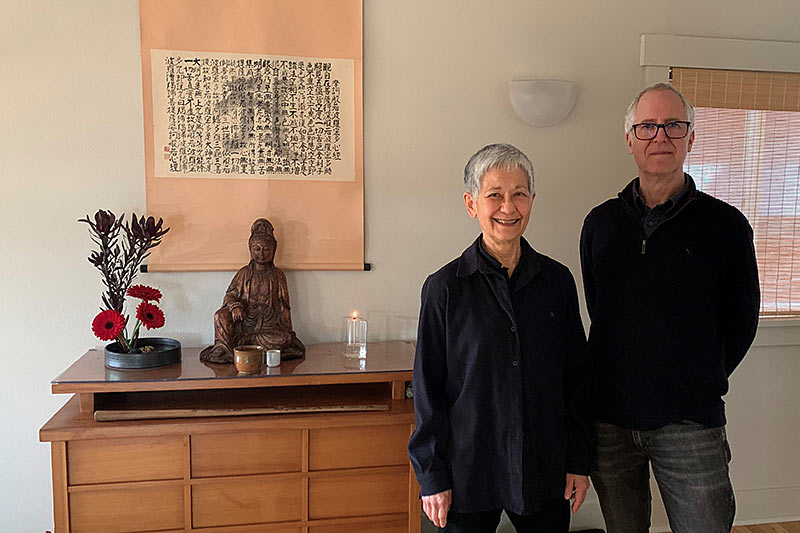
Lonliness – a talk by Madelon Bolling (April, 2023)
This week we’ve been exploring relationship: various ways of relating with one another, with our practice, with ourselves, with the world in general and in all its amazing particulars. Seeing that we are interrelated in so many respects, I wondered at the plague of loneliness that sweeps through traumatized people whether from a pandemic or from dangers of other sorts – shooters on the loose for instance, railroad accidents, war, or uncontrollable weather events. How are we to deal with these realities and their effect on us? In the...
read moreWhy Does It Come to That? – A Talk by Madelon Bolling
One time when the Master was washing his bowls, he saw two birds contending over a frog. A monk who also saw this asked, “Why does it come to that?” The Master replied, “It’s only for your benefit, Acarya.” (Record of Tung-shan, case 98) As descendants of generations of colonizers here in this country, we are slowly coming to terms with our deep, personal, and inextricable connections with the natural world....
read more(Trust) – a Talk by Madelon Bolling
Raven took his perch on the Assembly Oak and addressed a special meeting of the Tallspruce community, saying, “It’s time for me to be to moving on.” [snip] A hush fell over the circle. Grouse could be heard sniffling. At last, Porcupine asked, “Do you have any last words for us?” Raven said, “Trust.” (Aitken, Zen Master Raven. p.201) How is it that trust would be the last word, the encompassing summary of Zen master Raven’s life work, his legacy to the sangha? Life is puzzling: unsatisfactory, painful. Sometimes we glimpse something just out...
read moreTalks from 7-day meditation retreat
Every Moment Zen A talk by Lee Shields Sesshin, Distractions, and Turning Away A talk by Lee Shields Beyond Intention A talk by Lee Shields Distractions: Meeting With Mara A talk by Madelon Bolling Touch the Mind A talk by Lee Shields Until Only the Mountain Remains A talk by Lee Shields
read moreUntil Only the Mountain Remains – A Talk by Leland Shields
Until Only the Mountain Remains Leland Shields, September 16, 2022 The birds have vanished down the sky. Now the last cloud drains away. We sit together, the mountain and me, until only the mountain remains. Translated by Sam Hamill, Poetry Foundation article 178390 I’ve brought this 8th century poem by Li Po to several talks recently. Apparently I can’t get enough of it. It carries a patient persistence that is essential for a retreat. Over the hours, zazen can be dynamic, motivated, boring, dozey…all are zazen. All support the quiet...
read moreTouch the Mind – A Talk by Leland Shields
Touch the Mind Leland Shields – September 15,2022 There was a time when meadow, grove, and stream, The earth and every common sight, To me did seem Appareled in celestial light, The Glory and the freshness of a dream, It is not now as it hath been of yore; – Turn wheresoe’er I may, By night or day. The things which I have seen I now can see no more Wordsworth; https://www.poetryfoundation.org/poems/45536/ode-intimations-of-immortality-from-recollections-of-early-childhood I begin the talk today not with words of our ancestors from the...
read moreDistractions: Meeting With Mara – a Talk by Madelon Bolling
What ails you? Lack of faith in yourself is what ails you. If you lack faith in yourself, you’ll keep on tumbling along, following in bewilderment after all kinds of circumstances and being taken by them through transformation after transformation without ever attaining freedom. Bring to rest the thoughts of the ceaselessly seeking mind . . . The Record of Lin-chi, (Discourse X) Awareness practices fascinated me when I was quite young, due in part to being very near-sighted and in part to being a natural-born introvert. I say “awareness...
read moreBeyond Intention – a Talk by Leland Shields
Beyond intention Leland Shields, September 13, 2022 Turn around the light to shine within, then just return. The vast inconceivable source can’t be faced or turned away from. Meet the ancestral teachers, be familiar with their instruction, bind grasses to build a hut, and don’t give up. Let go of hundreds of years and relax completely. Open your hands and walk, innocent. Thousands of words, myriad interpretations, are only to free you from obstructions. If you want to know the undying person in the hut, don’t separate from...
read moreSesshin, Distractions, and Turning Away – A Talk by Leland Shields
Sesshin, Distractions, and Turning Away Leland Shields, September 12, 2022 Driven to find how to live in this world of sickness and inescapable loss, Siddhartha spent years searching in all ways available among the teachers and seekers of his time. He remained unsatisfied after years of effort, with great will, and with belief that spiritual sustenance was possible while denying the body to the point of emaciation. He sat until strength failed him. A woman taking milk to market saw Siddhartha and made a compassionate offering of milk....
read moreEvery Moment Zen – A Talk by Leland Shields
Every Moment Zen Leland Shields, Intensive Day 1, September 11, 2022 The sounds of the valley streams are his long, broad tongue; The forms of the mountains are his pure body. At night I heard the myriad sutra verses uttered How can I relate to others what they say? Dogen, Eihei; (translation) Cook, Francis Dojun. How to Raise an Ox: Zen Practice as Taught in Master Dogen’s Shobogenzo (pp. 69-70). Wisdom Publications. Kindle Edition. As we begin a week of retreat, I’d like to emphasize every-moment Zen; reminding us all to attend to...
read more
